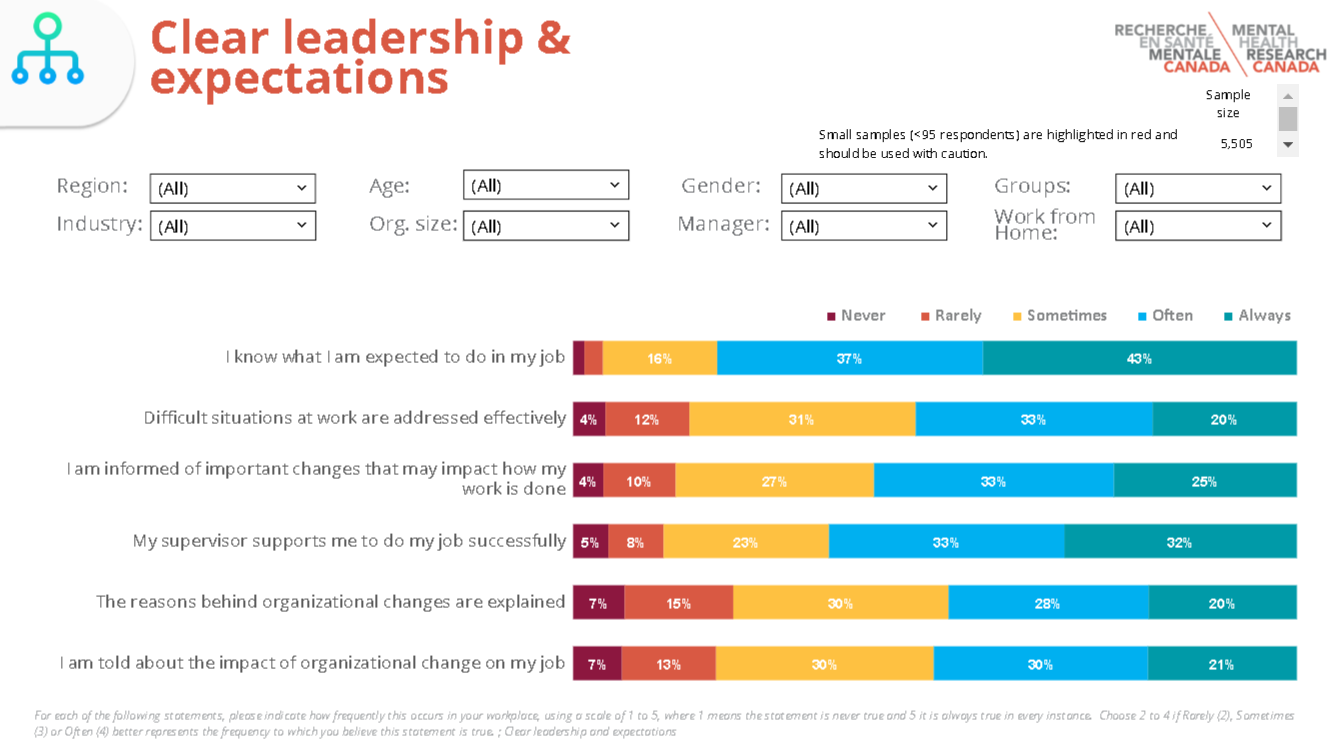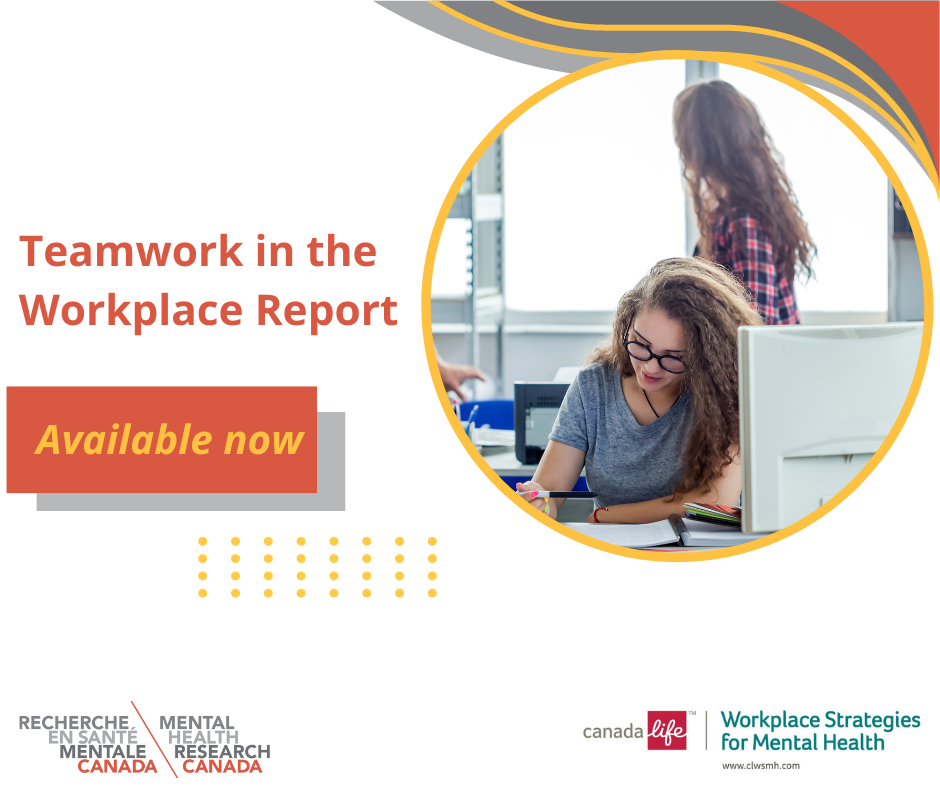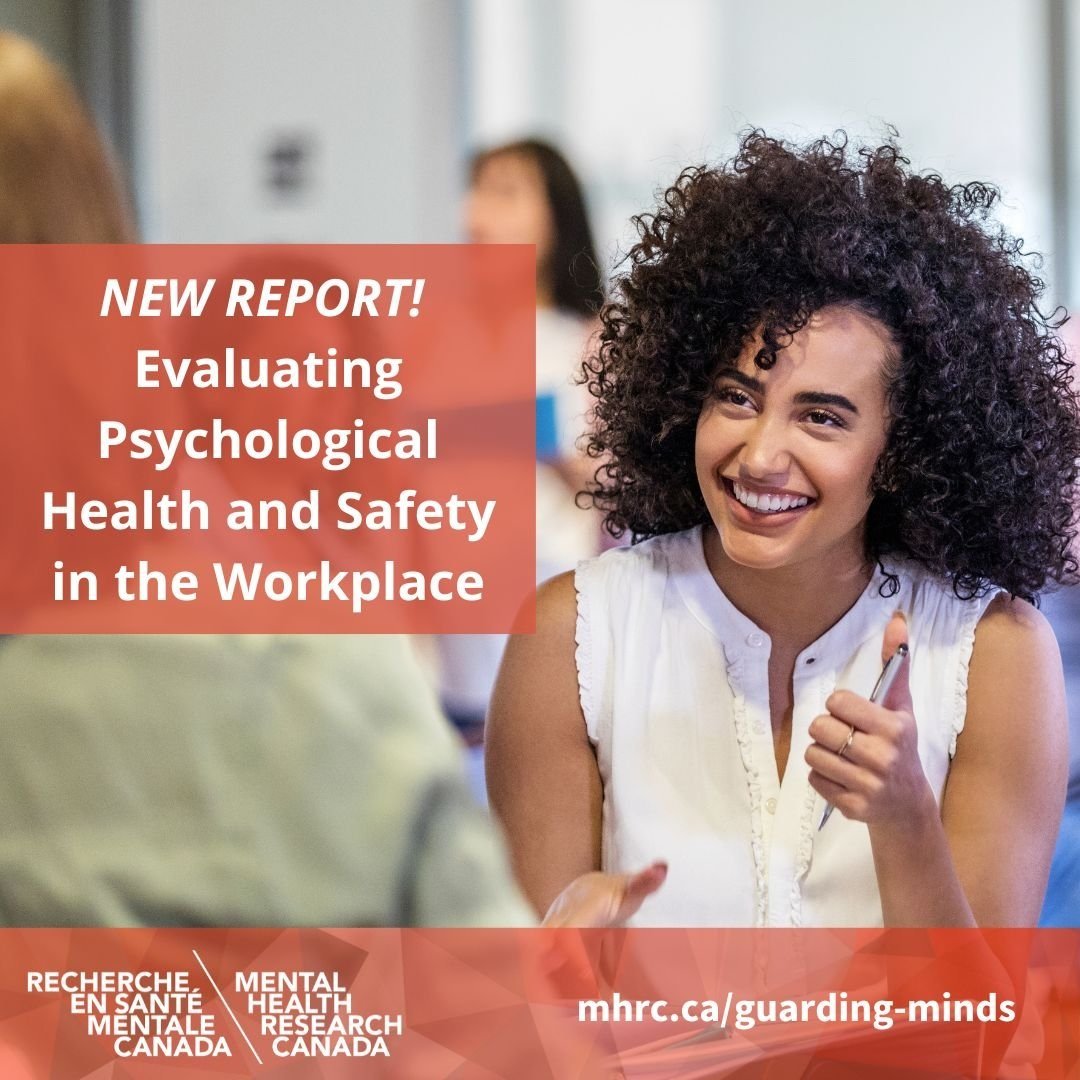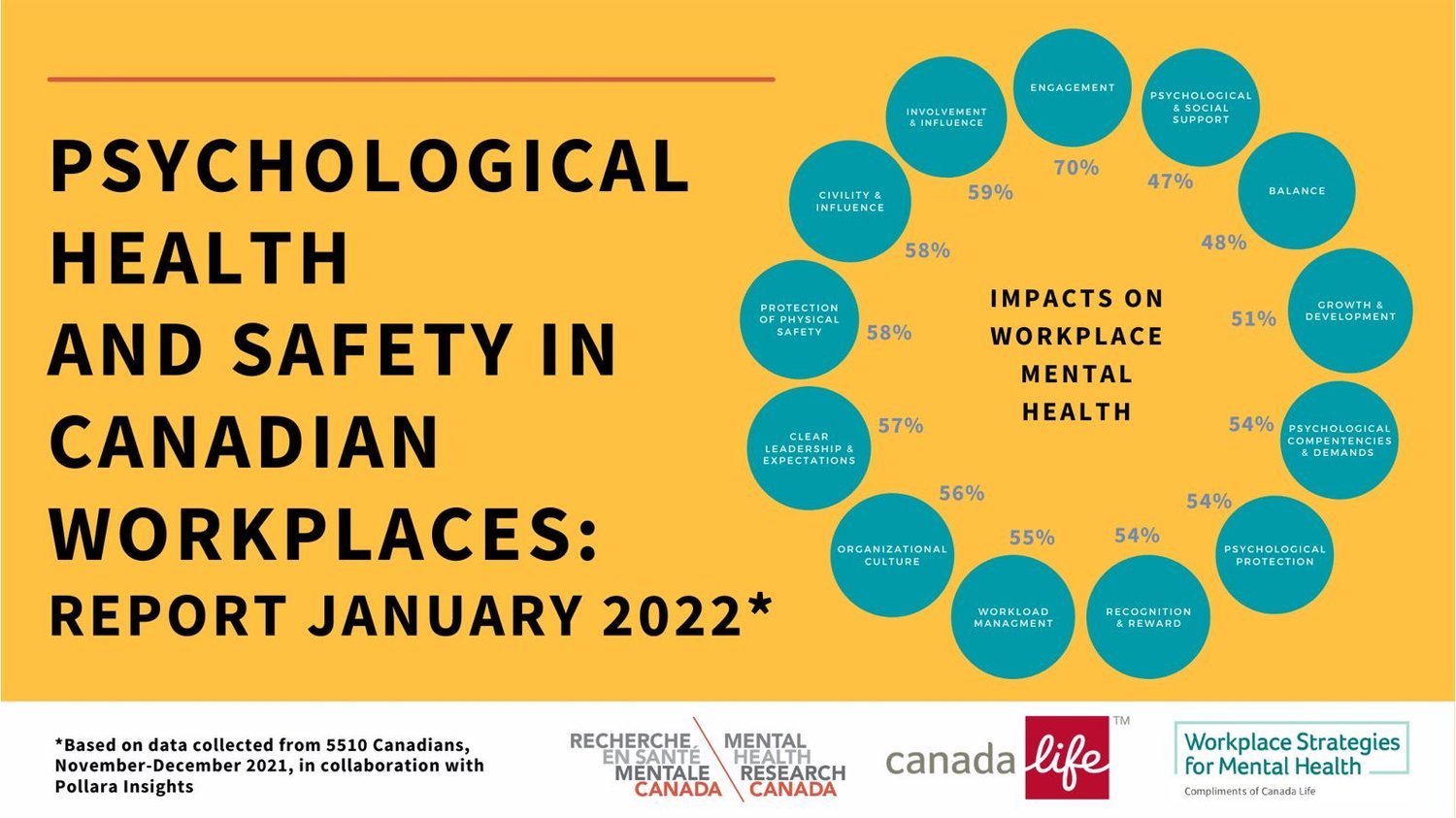
WORKPLACE MENTAL HEALTH
One in five Canadians lives with mental health challenges. The hardest hit are employed Canadians in their early and prime working years. The reality of COVID-19 has significantly blurred the line between work life and home life, exacerbating this situation.
Employers, too, feel the effects of poor mental health on their business – via absenteeism, decreased productivity and increased health care costs. Despite this, 70% of businesses in Canada do not have a workplace mental health strategy in place, even though there is a return of $1.62 for every $1 invested according to a 2019 Deloitte study. MHRC has launched various initiatives to address this critical need in our society. Explore MHRC’s work in this area through the REPORTS and RESOURCES sections below.
Explore our Workplace Mental Health Data Hub, developed in partnership with Canada Life and Workplace Strategies for Mental Health, to access comprehensive statistics on industry, region, organization size, and other insights across Canada, grounded in the Guarding Minds framework for Psychological Health and Safety in the Workplace.
Mental Health in the Workplace - 2025
This report, created in partnership with Workplace Strategies for Mental Health and Canada Life, is part of a series addressing the need for evidence-based insights into workplace mental health in Canada. It explores the growing impact of burnout on employees and organizations, highlighting the costs, challenges, and opportunities for prevention.
Among our interesting findings:
Burnout affects 39% of Canadian employees and costs employers up to $28,500 per person annually. Companies that invest in prevention cut burnout rates nearly in half and save about $3,400 per employee.
Half of Canadian workers experience mental health issues that affect their work, yet only one-third share this with their employer. Most remain productive despite their diagnosis.
Support from co-workers and managers has the strongest impact on employee mental health. Paid time off, personal days, and flexible schedules are the most effective forms of support.
Psychological Health and Safety in the Workplace - 2024 Update
In partnership with Canada Life and Workplace Strategies for Mental Health, this study examines self reported factors of psychological health and safety in Canadian workplaces. The work is an update of a 2023 study and is informed by data gathered online from over 3,200 respondents by Pollara Strategic Insights in July 2024.
Among our more interesting findings:
Employed Canadians are more likely to say their mental health has improved rather than declined over the past 12 months.
One in four (24%) working Canadians report experiencing burnout 'most of the time' or 'always,' up from 21% last year but significantly improved since the pandemic.
More than two-thirds (68%) of employed people consider their workplace psychologically safe.
23% of employed Canadians believe their workplace is not psychologically safe.
Half (52%) of managers believe they can identify when team members are struggling with psychological distress.
Trauma and Stress in the Workplace
In partnership with Canada Life and Workplace Strategies for Mental Health, this study examines the indicators of trauma and stress in the Canadian workplaces. The work is informed by data gathered online from over 5,500 respondents by Pollara Strategic Insights in March / April 2023.
Among our more interesting findings:
22% of respondents report being exposed to trauma at work.
20% of respondents indicate that the nature of their job involves unavoidable risk to psychological harm
Two-fifths of respondents (38%) are still impacted by their trauma, while half (48%) have recovered from it.
Clients (46%), coworkers (29%), and direct managers (27%) are the most frequent sources of workplace trauma.
27% of respondents indicated that people at work do not often or always recognize the importance of protecting employees’ physical safety and 45% of respondents indicated the same about protecting employee psychological safety.
Teamwork in the Workplace
In partnership with Canada Life and Workplace Strategies for Mental Health, this study examines the indicators of mental health in Canadian workplaces. The work is informed by data gathered online from over 5,500 respondents by Pollara Strategic Insights in March / April 2023.
Among our more interesting findings:
Respondents reported a high level of respect and inclusivity within their team, but slightly less respondents feel comfortable expressing themselves, and some do not believe their team holds everyone accountable.
One fifth (19%) of respondents indicated that their team does not “always” or “frequently” interact respectfully and is not free of discrimination (22%). Additionally, one quarter believe that their team does not frequently resolve differences in opinions respectfully (28%), and one in four say they do not feel valued a s a team member (24%). Approximately one in four do not often feel comfortable being themselves at work (26%), one third are uncomfortable speaking up (33%) and do not agree that al l t heir team members are frequently held accountable (33%).
Guarding Minds at Work - Evaluating Psychological Health and Safety in the Workplace
In partnership with Canada Life and Workplace Strategies for Mental Health, this study examines the indicators of mental health in Canadian workplaces. The work is informed by data gathered online from over 5,500 respondents by Pollara Strategic Insights in March / April 2023.
Among our more interesting findings:
21% of educators (and 22% of first responders) feel it is rarely or never safe to speak up at work.
Only a third (34%) of educators believe difficult situations at work are dealt with effectively.
Only 29% of retail workers feel they are paid fairly for the work they do.
Nearly half (45%) of younger workers (18-34) indicated their workload was unreasonable.
Nearly two-thirds (63%) of respondents in health care and retail indicate high turnover is a significant issue.
54% of younger workers feel lonely at work at least some of the time.
Only half (47%) of employees in large workplaces (500+ employees) are experiencing a positive workplace culture.
Click here to read more and to access our interactive data hub and infographic.
Emotional Intelligence in Canadian Workplaces
Conducted in co-operation with Canada Life and Workplace Strategies for Mental Health from data gathered online from over 1800 respondents by Pollara Strategic Insights March 2022,
This study examined the self-perceived emotional intelligence of respondents through agreeing or disagreeing to a series of statements regarding their own their own emotions and those of others in the workplace.
Searching for promising practices in workplace mental health and wellness: a report by MHRC and Mood Disorders Society of Canada
The Mood Disorders Society of Canada (MDSC) and Mental Health Research Canada (MHRC) are working with our national and regional partners to support the workplaces of our country. We are seeking emerging promising practices with a view to strengthening workplace mental health post-pandemic.
Workplace Mental Health Strategies in a Post-Pandemic World, a report from Mental Health Research Canada and Mood Disorders Society of Canada (MDSC), was authored by Heather Stuart, PhD, FRSC, C.M., and published October 2021.
MDSC has developed a survey to gather additional data from persons and companies, looking at collecting information from Canadian workplaces, managers and staff so that we can highlight successful best and promising practices on the MHRC and MDSC websites.
Please take a few minutes to complete the survey by clicking the link below:
Psychological Health and Safety in Canadian Workplaces: January 2022
Conducted in co-operation with Canada Life and Workplace Strategies for Mental Health from data gathered online from over 5500 respondents by Pollara Strategic Insights November-December 2021, this 72-page study covers a wide scope of Canadian workplaces, including the high levels of burnout reported by Canadians as a result of COVID-19.
40% of employees have help from employer coping with workplace stress
48% of First Responders feel their work inherently includes psychological risk
82% of employees in the transportation industry feel that disclosing a mental health issue would affect their career prospects
45% of Black Canadians feel safe from workplace discrimination
Only 4% of Canadians have workplace policies that have adapted with new COVID-19 mental health supports
Key findings include:
35% of all employed Canadians indicate they are burned out
A staggering 66% of Nurses in Canada are burnt out
39% of employees have been prepared by their employer to deal with their job’s psychological demands
46% of employees receive feedback that helps them grow
48% of employees feel they are given time to participate in training
35% of employees have access to programs to prevent burnout
Psychologically Safe Leaders Assessment (PSLA): Canadian Managers Research Report
The Psychologically Safe Leader survey is a collaboration with Workplace Strategies for Mental Health, compliments of Canada Life, and Mental Health Research Canada to assess self-perception among managers on the management of workplace mental health.
Overall, leaders of people in Canada feel that they are doing a good job of supporting the mental health and well-being of their team members. This view is relatively consistent across industries and provinces. Older leaders and women rated themselves slightly higher than younger leaders and men.
While nearly two-thirds (67%) of employees agree that their leader is effective in supporting their mental health, the report shows that there are a few key areas where employees think their leaders are lacking.
RESOURCES
One in five Canadians lives with mental health challenges. The hardest hit are employed Canadians in their early and prime working years. The reality of COVID-19 has significantly blurred the line between work life and home life — exacerbating this situation.
Employers, too, feel the effects of poor mental health on their business – via absenteeism, decreased productivity and increased health care costs. Despite this, 70% of businesses in Canada do not have a workplace mental health strategy in place, even though there is a return of $1.62 for every $1 invested according to a 2019 Deloitte study.
Prior to the pandemic, MHRC had reached out and collaborated with partners Canada-wide to curate and share evidence-based resources, promoting them on workplaceMH.ca with the goal of launching Canada’s first annual Workplace Mental Health Day on the third Wednesday in April.
We are still committed to advancing mental health in work environments of all kinds; we will re-launch this initiative. It will reflect and address the mental health challenges facing Canada’s new and evolving workplace reality.










